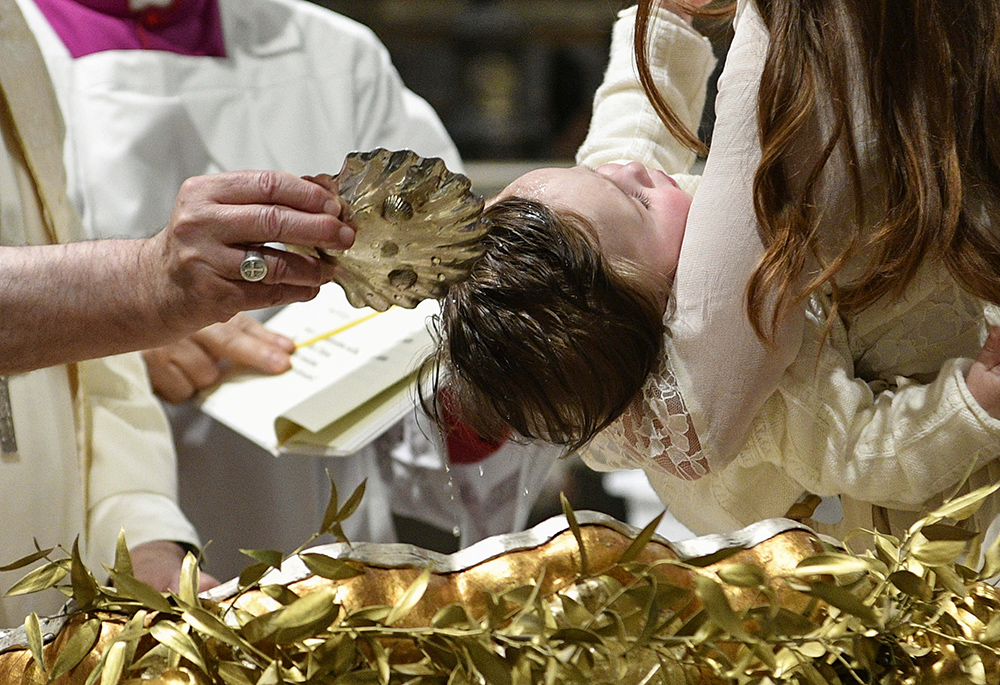
Pope Francis baptizes one of 13 babies during a Mass celebrating the feast of the Baptism of the Lord in the Sistine Chapel Jan. 8 at the Vatican. (CNS/Vatican Media)
"Whoever receives a prophet because he is a prophet will receive a prophet's reward."
When Jesus made that magnificent promise, he was offering a new twist on traditional Semitic morality which taught that one must care for anyone who is vulnerable. The practice of offering a stranger board and bed developed in a harsh desert climate, one in which everyone involved knew what it was like to be lacking food or shelter. To welcome the stranger could mean saving that person's life — and vice versa. At the same time, although the Jewish people's appreciation of hospitality called them to care for any traveling stranger, their sacramental sense of praying the table blessing meant that they would dine only with people who could share their devotion to the God of Abraham, Isaac and Jacob. (That's the reason for not eating with Gentiles or sinners.)
Stop for a moment and think again about the implications of what's been said here. First, in Jesus' culture, anyone who had home and food felt impelled to share not only because that is simply what any respectable person does, but because it was often a question of life or death. Secondly, sharing a table implies that the people gathered are in deep communion with one another. That's where the prophet's reward comes in: sharing the table or taking a prophet into your home functions as a sacrament of solidarity; it affects what it symbolizes. You and the prophet become as deeply connected as relatives.
Today's Liturgy of the Word begins with the wandering prophet Elisha meeting "a woman of influence." After giving him meals, the woman talked her husband into making a room for Elisha in their empty-nest home. That led Elisha to repay her with one of the Bible's favorite promises: "You who were childless will soon have a son." That promise went beyond anything that the apparently unmarried Elisha had received.
The promise we began with comes from the second part of what we hear from Jesus today. The Gospel opens with a statement to the apostles: "Whoever loves father or mother or children more than me is not worthy of me." Now, that sounds harsh. If we put the prophet's reward together with the demand to love Jesus and his representatives above all, we realize that Jesus is establishing a new sort of family bond, one based on love and a common commitment rather than blood kinship.
Advertisement
The idea of kinship based on relationship to Jesus rather than family provides a way to understand Paul's teaching about being baptized into Christ Jesus. For Paul, baptism signifies death to one way of life in order to live in "newness of life." Paul sees baptism as the way a disciple becomes identified with Christ Jesus — assuming the pattern of his life. It is the entryway into living for God.
Today's three readings comment on one another. The story of Elisha reflects on the blessings of receiving the stranger, especially when that stranger is a prophet. The Gospel reminds us that receiving a prophet entails both rewards and danger: Those who identify with Christ will learn the lesson of losing their lives — and receiving them back — as Jesus himself did. Paul's message to the Romans reminds us that baptism incorporates us in two ways: We become family even as we enter into the rhythm of Christ's death and resurrection.
What are we to take away from these readings? Paul challenges us to recognize that accepting baptism frees us to share all that we are as Jesus did in giving his very body and blood for others. Contemplating Jesus' words about losing and saving our lives, we realize that he wants us to take this message with utmost seriousness. What Jesus says here anticipates the parable of the sheep and the goats (Matthew 25:31-46). It teaches that acts of Christian hospitality get turned inside out: The guest in need becomes a source of blessing for the host, and the needy visitor becomes prophetic by calling forth saving love. Host and guests are transformed into family.
Today, as we prepare to celebrate July 4, we might ask ourselves some of the following questions: "Who are the prophets in our society? Who is calling us to a deeper living of the Gospel? Whose need reminds us of the fragility of all life and our universal need for solidarity?" As in the days of Elisha and Jesus, our responses are often a matter of life and death.
